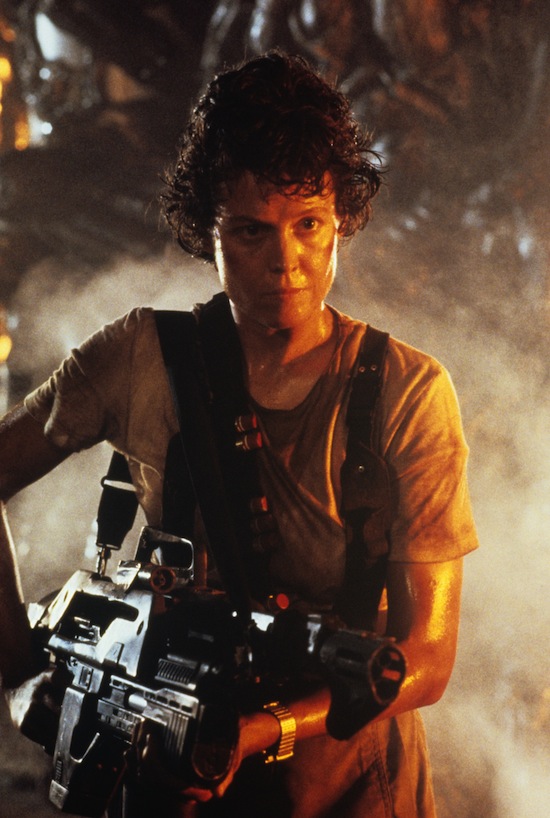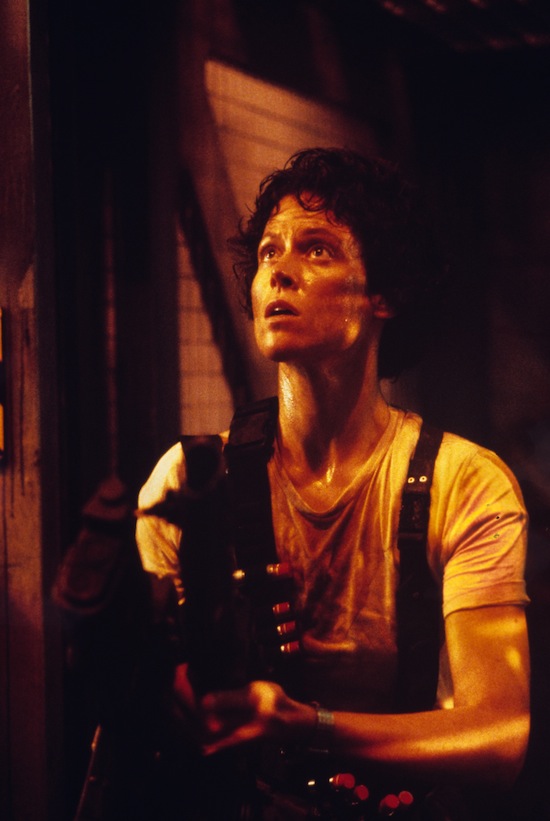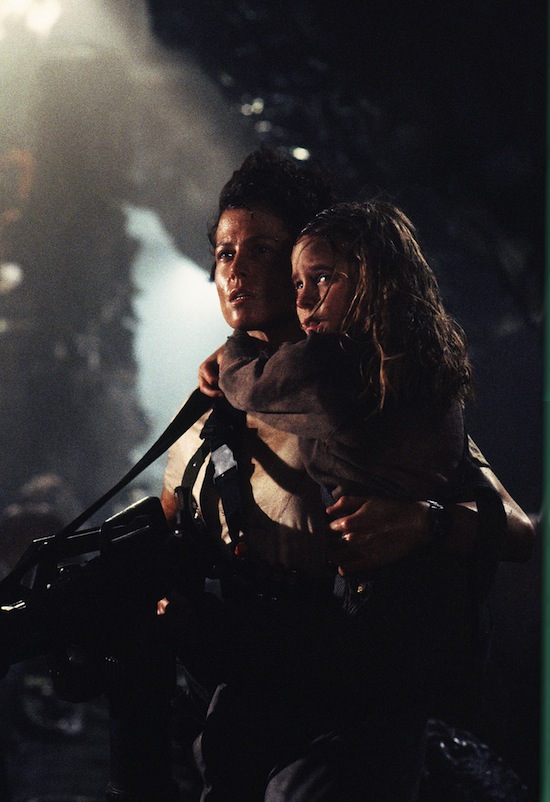All Aliens stills courtesy of Avex Classics International
In the 1962 novel A Clockwork Orange, the main character Alex likens the act of playing pop music through a state-of-the-art hi-fi to keeping a cheap fizzy drink in a cut-glass crystal decanter. A similar analogy comes to mind when Aliens, still a disturbingly violent slab of pop culture despite hitting the ripe old age of 30 this year, appears on the screen at the Royal Albert Hall. It’s hard to imagine the monarch who erected the place in 1871 being into the concept of space marines eviscerated by nightmarish eyeless monsters. (Then again, if David Icke is right, she was an alien lizard herself.) The RAH is just too classy for an action film, no?
No indeed. The combination of film and venue works unbelievably well. Look at the place, it’s sold out: packed to the gills with 5,000 sci-fi fans wearing Weyland-Yutani T-shirts and whatnot, alternating between gobsmacked silence and bouts of cheering when the best of the 30-year-old lines echo through the RAH’s massive PA system.
Tonight’s screening, part of the Hall’s current Films With Live Orchestra season, stands out starkly against the previous entries in the series. The Godfather, Titanic, Jurassic Park and the three instalments of The Lord Of The Rings make much more sense for inclusion, at least on paper, than Aliens. Family-friendly fare with largely uplifting soundtracks, those movies fit the RAH’s comfortable image like a glove.
Conversely, Aliens is brutal: a first half built around sickening tension, followed by a second that is like being punched repeatedly in the stomach. Someone behind the scenes must have had serious balls/ovaries to consider putting this film on.
The USP here is that the London Philharmonic Concert Orchestra, a reduced version of the mighty Philharmonic, is playing the orchestral parts of the score live. The conductor, Ludwig Wicki, nails every detail with microsecond precision. If you know the film, directed by a young, hungry James Cameron years before he ever heard of Leonardo DiCaprio, keeping an eye on Wicki a few seconds before each unexpected shock is educational and amusing. As you count down to a given jump-out-of-your-seat moment – for example, when a dead facehugger suddenly turns out to be trousers-wettingly alive – Wicki raises his baton and the string musicians ready their bows. The subsequent giant blast of noise from the orchestra is rendered even more effective by the sound of people around you filling their drawers.
It’s a bit like going back to 1920 and seeing an orchestra pit supply the music to the screened visuals, except with phallic, fang-toothed larvae bursting out of people’s innards.
Highlights? Where to start? For God’s sake, Aliens is flawless, scene by unforgettable scene. It opens with Ellen Ripley, the iconic hero played by Sigourney Weaver, asleep in the spacecraft from which she escaped the original Alien‘s titular beastie back in 1979, or 57 years beforehand in her universe. A horribly creepy robotic probe floats in and silently scans the interior: it alone causes the viewer’s bladder to backflip. Later, after being transported to a hospital bed on the Gateway space station, Ripley undergoes a nightmare where an alien prepares to burst out of her abdomen, the fate endured by John Hurt’s doomed crewman in the first film.
And this is just the first five minutes. Already, we’ve had full-blown brass and timpani from the orchestra, resolving to ominous silence broken only by a single violin trill, a bit like Satan scratching a blackboard with his fingernail.

It’s the palette of emotions that this film evokes which makes it so compelling, as well as Cameron’s deft direction and the expert build and periodic release of tension. Within the film’s first half hour, Ripley has been persuaded to return to the original planet against her better judgment, accompanied by a bunch of tough but fatally overconfident marines who assume they’ll be able to wipe out the aliens and fly home. A poor choice, as it turns out.
The tone lightens a touch here: in fact, there’s tons of macho but charismatic comedy once the marines are introduced. Bill Paxton’s character, Hudson, is a wisecracking blue-collar grunt with the best lines ever written for an on-screen soldier ("Oh, you want some, motherfucker? Come on then, I don’t got all day" etc). And he’s just the tip of the iceberg in a supreme cast: Michael Biehn plays the cautious Hicks; Lance Henriksen is an android running through a subplot in which he has to gain Ripley’s trust; Jenette Goldstein plays a fantastically tough smartgun operator, Vasquez; and Paul Reiser is a villainous corporate scumbag.
Perhaps the best role is that of Sgt Apone, the veteran officer who awakes from hypersleep, sticks a cigar in his mouth and swaggers through the marines’ spaceship barking lines like, "Let’s get moving, sweethearts, they ain’t paying us by the hour." All this soldierly stuff, borrowed by Cameron’s own admission from Robert Heinlein’s 1959 novel Starship Troopers, would be too much to take seriously if the marines’ human side wasn’t revealed so clearly: they’re vulnerable, and fallible, and they get wiped out.
As I said, Aliens is an emotional rollercoaster. If you don’t punch the air in joy when Ripley emerges from the elevator inside a power loader and barks, "Get away from her, you bitch!" at the alien queen, you’re dead inside. If you don’t wipe away a tear at the end when Newt, the colonist child who Ripley rescues, whispers, "I knew you wouldn’t leave me", you have no soul. And if you’re not left speechless by the late James Horner’s immense orchestral soundtrack, Weaver’s on-the-edge-of-falling-apart performance and the glistening hardware, you don’t like action films in the first place. That’s fine, but keep reading, because this isn’t just an action film.
Throughout, James Cameron and his co-producer (and then wife) Gail Ann ‘The Walking Dead‘ Hurd keep you dangling by a thread of suspense. Who hasn’t felt frustration boil over while waiting for a lift to arrive? Now imagine you’re in hell, clinging on to your child, with the worst demon in the universe stalking you, waiting for that lift. It doesn’t get more stressful than that. I’ve seen Aliens over 50 times and I still worry that the damn lift won’t arrive in time. In fact the ‘annoyingly slow lift’ device is used twice: earlier, Ripley and Hicks fail to get an elevator door shut in time to prevent the intrusion of an alien, which inconsiderately gobs acid all over Hicks when he shoots it in the face.
When the film ends, the orchestra play through Horner’s beautifully downbeat closing theme, and Weaver, Cameron and Hurd take the stage for a quick wave. This unexpected legitimisation of the RAH’s live version of the trio’s best film has more than a few people in the audience gasping in shock, but there’s a solid reason for the presence of these luminaries. And it’s not a particularly cheerful one.
Like their colleagues in the music world, modern creatives in mainstream film appear largely to have run out of creative capital. Remake, reboot, sequel, prequel and midquel fever is at a pitch. Film-makers, studios and most importantly audiences are looking backwards, not forwards.
Major-studio films which say something meaningful about the violent side of the human experience haven’t exactly been thick on the ground in recent years. With a handful of notable exceptions, none of which come from Hollywood, horror movies have spent the last two decades oscillating conservatively between zombies, vampires and gratuitous torture porn. The action film genre, if indeed there is such a genre in the way it was once defined, is typified by puerile Transporter or Expendables shoot-’em-ups or bland Bourne and Bond clones. And don’t even start me on the Marvel superhero franchises, the most undemanding movies ever made.
As Hudson put it before the aliens cocooned him, we’re on an express elevator to hell – going down.
No wonder Aliens has been repackaged, with the repackage so willingly authorised by its creators – and no wonder it’s so popular among geeks like me. Not only is it better written, performed and produced than any equivalent genre movie since its release in 1986, it stands atop the action movie pile, full stop.

There are obviously hard science fiction films of equal stature: 2001: A Space Odyssey, the first Terminator and arguably The Matrix among them. High fantasy franchises such as Star Wars overlap with the setting, and futuristic dystopias like Blade Runner share the atmosphere. But action films, as in people blowing things up and/or being blown up with military hardware? Aliens owns ’em all.
On every score, Cameron and Hurd levelled the competition with this movie. They were fearless when they wrote and cast the thing, for starters. An archetype of Ripley’s tough-as-nails lead character had been established by Linda Hamilton’s Sarah Connor in Cameron’s own Terminator, released two years before Aliens, but Ripley is a much more complex character than Connor.
Then there’s the special effects, which were state-of-the-art for the day and still don’t look dated, the odd matte background aside. What other 80s film can you name that doesn’t look like an 80s film? Watch the DVD extras and laugh in disbelief at how primitive the SFX are off-camera: you won’t laugh for long when you see the convincing mockup of the alien queen in progress, a 12-foot high nightmare in black refuse sacks.
And the technology: oh, the technology. Cameron knew just how obsessed his filmgoers would be with glittering weapons and other hardware, and catered for that fetish admirably. The M41-A pulse rifle and its instantly recognisable automatic-fire sound is the most prominently cool bit of kill-tech, complete with digital readout on the side (literally nothing was cooler than a digital readout in 1986). The armoured personnel carrier; the motion trackers with their terrifying ascending bleeps; the robot sentry guns; the ultra-sleek spacecraft… I could go on.
Despite all the above, Aliens is not just for weapons and monster nerds: it’s a human story. At heart, it’s the tale of a mother trying to protect her child. Yes, the setting is a little more hostile than usual; yes, Ripley has to dig a bit deeper than most of us to keep her offspring safe. But the fact that she pulls it off resonates with us anyway. She’s just like the rest of us: scared, lonely and isolated, but determined to make it work. That’s one of the advantages that Aliens has over its competition. Arnie, Sly, Bruce, Dolph and Jean-Claude may have ruled the 80s in box office numbers, but Aliens wins the moral victory.
I know James Cameron went on to direct huge-selling slush like Titanic and Avatar. So what? His winning streak from 1984 to 1988 includes The Terminator, Rambo: First Blood Part II and The Abyss as well as Aliens, and extends as far as 1991 if you include the slightly dodgy Terminator 2. That’s an inspired filmography by any standards.
As a shallow, beer-swilling student, as I was when I first saw Aliens in the 80s, none of this analysis crossed my mind, but I did get a lot of moronic enjoyment out of quoting and requoting lines of the dialogue at people. You don’t have to be clever to enjoy this film. But if you wish to apply your grey matter to Aliens, as I did when maturity arrived, you quickly realise that the film stands up to the very best of the genre’s tentpole movies – and surpasses them.
Aliens is the last sci-fi or action film that actually pushed those genres forward. It can’t now be topped, not within the constraints of its type. There’s no other way to end this… it’s game over, man. Game over.



